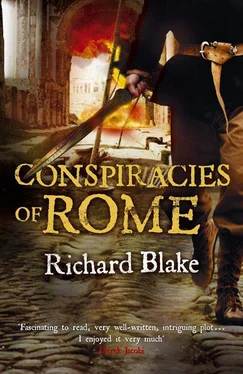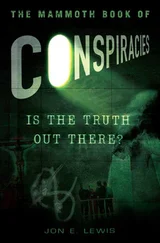Richard Blake - Conspiracies of Rome
Здесь есть возможность читать онлайн «Richard Blake - Conspiracies of Rome» весь текст электронной книги совершенно бесплатно (целиком полную версию без сокращений). В некоторых случаях можно слушать аудио, скачать через торрент в формате fb2 и присутствует краткое содержание. Жанр: Исторические приключения, на английском языке. Описание произведения, (предисловие) а так же отзывы посетителей доступны на портале библиотеки ЛибКат.
- Название:Conspiracies of Rome
- Автор:
- Жанр:
- Год:неизвестен
- ISBN:нет данных
- Рейтинг книги:3 / 5. Голосов: 1
-
Избранное:Добавить в избранное
- Отзывы:
-
Ваша оценка:
- 60
- 1
- 2
- 3
- 4
- 5
Conspiracies of Rome: краткое содержание, описание и аннотация
Предлагаем к чтению аннотацию, описание, краткое содержание или предисловие (зависит от того, что написал сам автор книги «Conspiracies of Rome»). Если вы не нашли необходимую информацию о книге — напишите в комментариях, мы постараемся отыскать её.
Conspiracies of Rome — читать онлайн бесплатно полную книгу (весь текст) целиком
Ниже представлен текст книги, разбитый по страницам. Система сохранения места последней прочитанной страницы, позволяет с удобством читать онлайн бесплатно книгу «Conspiracies of Rome», без необходимости каждый раз заново искать на чём Вы остановились. Поставьте закладку, и сможете в любой момент перейти на страницу, на которой закончили чтение.
Интервал:
Закладка:
‘Then let us begin.’
I dressed in the black suit of clothes Lucius had prepared for me. As I stood naked before him, he stepped forward to embrace me, but pulled back, muttering something about the need for purity of heart and body. He led me across to one of the smaller book racks against the wall. He pulled at it, and pulled again. With a gentle creak, it swung into the room on concealed hinges. There was a narrow doorway opening to a flight of steps that led down. Every few yards, a lamp shone dimly in its recess.
Lucius made a gesture of antique devotion and stepped through the doorway. I followed into the darkness.
We descended about fifty much-worn steps, our feet crunching as we walked on the unswept dust of many ages. The temperature fell and the air became damp and oppressive as we went. The lamps glimmered more and more dimly, and guttered as we passed.
At the bottom of the steps, a narrow corridor stretched forward into the darkness. Lucius took up one of the lamps and walked confidently forward with me close behind. The flame of the lamp was reflected back from the dripping, concreted walls.
At last, we came to the end. As before, Lucius knocked gently on the door, giving his name. The door opened. We stepped into a low but wide chamber of vaulted brick. At the far end was another doorway, locked and barred. In the middle stood a small brazier, burning low in the stale air. Before this, together with his assistants, stood the priest I’d first met in the Colosseum. He was dressed in black, arms folded and head bowed.
‘It is all as you have commanded, O Great Lord Basilius, most noble servant of the Ancient Gods,’ he said, looking up. His resonant voice filled the chamber. I shuddered.
‘As ancient custom requires,’ he went on in a voice still deeper, ‘I ask if you are truly prepared for this most certain yet dangerous consultation?’
‘I am prepared,’ said Lucius, his voice dry and nervous.
‘Then let it commence, according to the ways of our ancient fathers.’
The priest waved his hand over the brazier. It suddenly flared up, filling the room with white, acrid smoke. At the same time, the room turned still colder. No breeze accompanied this. It was as if someone had uncovered a block of hidden ice.
Lucius stepped back, a panicky look on his face. I resisted an urge to burst out laughing. I hadn’t been able to see what the priest had concealed in his hand. But I’d seen this trick any number of times in Kent. Maximin had been quite adept in scaring audiences into conversion. The cold I couldn’t explain. But every trickster has his own way of exciting wonder in the gullible. Where miracles are concerned, you need know only the part of how they’re produced to dismiss the whole effect as a fraud.
I looked on with set features, now resisting the conditioned reflex to cross myself in a pretence of pious wonder. I tried not to think the worse of Lucius for his now clutching at my sleeve with an evidently rising terror.
The priest leading, the assistants took up a chant in the most archaic Latin I’d ever heard. It was in short sentences, the stress on many words moved unnaturally to the first syllable. Frequently, I could only guess the meaning from compounds in the pure language. Some words I couldn’t understand at all. I wish I had been able shortly after to sit down with a clear head and record this chant. I doubt if it exists in written form, and I’ve now forgotten all of it, except for the reiterated claim: Cume tonas Leucesie prae tet tremonti, which I took to mean: ‘When thou dost thunder, O Lord of Light, men do tremble before thee.’
But there was much more – all about the attributes and goodness and power and genealogy of the various Old Gods. At the end of each stanza, a silver bell would be rung, and the priest turned three times.
At the end of all this, the priest did his trick again with the hidden combustible. I could feel my teeth begin to chatter in the still growing chill of the place. He motioned the rest of us to take our places within circles traced on the ground with white meal. Then he walked firmly over to the locked door. One of his assistants unlocked and unbarred it, before darting back within his own circle.
The priest looked through the door. There was a small light within.
‘Is the victim purified?’ he asked.
From within, the answer came: ‘It is.’
‘Is the victim willing?’
‘It is.’
‘Has the victim been bled sufficiently?’
‘It has.’
The priest stood back and turned to us. ‘The communication is about to be opened,’ he said in a low, sinister voice.
Two other assistants entered through the doorway. With them, they carried what I took at first for a statue – a statue, indeed, of Christ taken down from the cross. It had about it the same twisted, bloodied whiteness as something I’d recently seen in a church.
But this statue was still breathing. Carried into our presence, naked and bound to a wooden post, was one of the slaves who’d failed to stop One-Eye the day before last.
The assistants set the post down a few feet from the brazier, and got within their own circles. The naked flesh shone pale in the dim light. His head hung down on his chest. Blood dripped in a thin trickle from great gashes on the inside of each forearm. The gasp of his breathing came high and shallow.
‘The victim stands between life and death,’ the priest cried triumphantly. ‘He sees us, and he sees the Gods. Through him, we speak to the Gods, and they speak to us. It is all as ancient custom requires.
‘Ask what you will, O Lord Basilius, most noble and most pious.’ He turned back to the brazier and muttered some nonsense that I didn’t fully catch.
I stood rooted to the spot. I hadn’t known what to expect as the culmination of this ceremony. But the last thing I’d expected was a human sacrifice. My own people used to go in for this sort of thing. But they had the excuse of being savages who didn’t know better.
I once read that Julian the Apostate – the emperor, that is, who tried to restore the Old Religion fifty years after Constantine had established Christianity – sacrificed humans before setting out on his disastrous invasion of Persia. His palace in Constantinople, apparently, was found after his death stuffed with decaying bodies.
I don’t believe this. Julian has a bad reputation, and the Christians have made up endless stories about him to drown out the rumours that they had him struck down from behind in his last battle. I know all Julian’s writings, and I don’t believe these stories. He may have been a superstitious pedant. But he wasn’t a murderer.
Equally, though, human sacrifice was one of those things about the Old Religion that its devotees have always been rather coy about. And you can remember this if ever anyone comes at you with a word of that crap about the world of light and reason that the Church is said to have brought to an end. The Church may be a fraud. But it’s never done this.
For a moment, I was torn. Lucius was my only friend in the world. He was doing this for me. But would Maximin have wanted this? Even had there been the slightest chance that this wretched human being was headed anywhere but into the blackness of death, could I have accepted the slightest scrap of information he might relay?
Non tali auxilio nec defensoribus isti, I thought to myself – ‘Not by such means, nor with these defences.’
‘Stop this at once!’ I cried, stepping forward. ‘I’ll have no part in bloody murder.’
I took hold of the slave’s arms and raised them to shut off the remaining flow of blood. He looked up to me, a weak, frightened look on his face. I saw his glassy eyes focus. He licked drily at his withered lips. ‘I haven’t been confessed, sir,’ he whispered. ‘Will God send me to Hell? I was a very bad slave – most inattentive to my duty. Will God punish me, sir?’
Читать дальшеИнтервал:
Закладка:
Похожие книги на «Conspiracies of Rome»
Представляем Вашему вниманию похожие книги на «Conspiracies of Rome» списком для выбора. Мы отобрали схожую по названию и смыслу литературу в надежде предоставить читателям больше вариантов отыскать новые, интересные, ещё непрочитанные произведения.
Обсуждение, отзывы о книге «Conspiracies of Rome» и просто собственные мнения читателей. Оставьте ваши комментарии, напишите, что Вы думаете о произведении, его смысле или главных героях. Укажите что конкретно понравилось, а что нет, и почему Вы так считаете.












